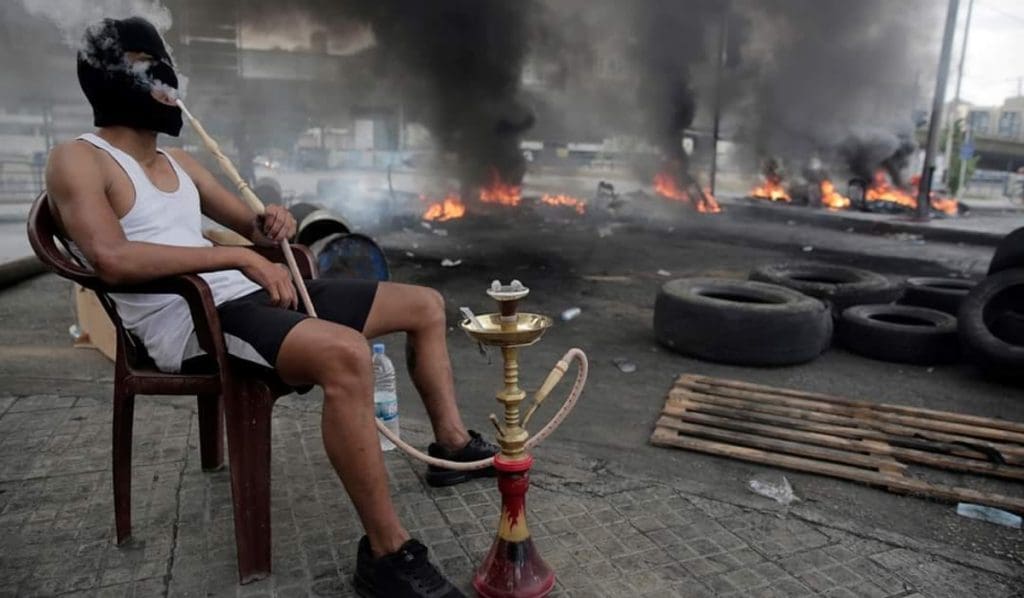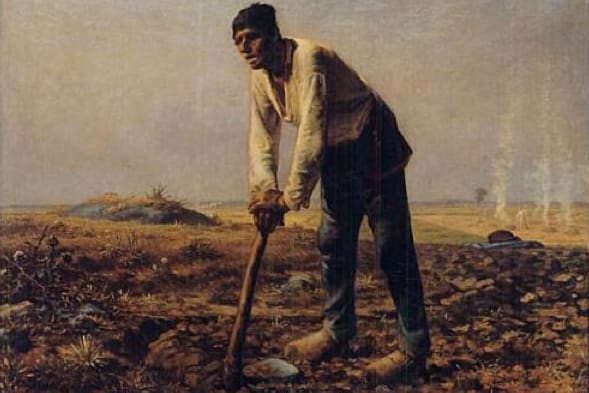Transcribed from the 6 January 2020 episode of This is Hell! Radio (Chicago) and printed with permission. Edited for space and readability. Listen to the whole interview:
The prospects for a revolution are nil, and yet the chances for radical transformation are better than ever indeed.
Chuck Mertz: We are no longer in an era of neoliberalism. No, neoliberalism retrenched following the financial collapse of 2007 and 2008, which it played a significant role in causing. Now, as our guest this morning argues, we are in an era of ‘precarity capitalism’ that’s even worse for society than the neoliberalism that caused the crash.
While we might not be in a position to overthrow capitalism, we might be able to overcome capitalism. Here to explain, political and social theorist and educator Albena Azmanova is author of Capitalism on Edge: How Fighting Precarity Can Achieve Radical Change Without Crisis or a Utopia.
Albena, welcome to This is Hell!
Albena Azmanova: Thank you, Chuck, very thrilled to be on.
CM: It’s great to have you on the show.
You write, “Our times are bereft of great crises, revolutionary upheavals, and utopias. Yet never before have the conditions been so ripe for overcoming capitalism without the help of crisis, revolution, or utopia. Radical progressive change without a revolutionary break is possible, and the time is ripe for it.”
Why doesn’t it need a revolution? Aren’t the world’s political and economic processes so deep-seated that the only way of possibly unseating capitalism is revolution? Or, why isn’t revolution enough?
AA: Very well, put me on the spot. It is a peculiarity of our historical time that revolution is not in the cards. But if it is not very likely to happen, do we have to give up? I say no. We can find resources for a radical change without the crutch, in fact, of a revolution, without the crutch of crisis, and without the crutch of utopia. We do not need The Wonderful Socialist Utopia in order to go in a different direction, a direction against capitalism.
We’re living a very strange historical time which has its special kinks. Look around—is capitalism in crisis? Hardly. The western economies, ten years after the big financial meltdown, are back to solid ground. But many people feel frustrated. They live in hell. There is a renewed interest in socialism, but the idea has lost much of its glory and glamour. It’s not so attractive for many. It was badly discredited by the dictatorships in eastern Europe and elsewhere. The idea of socialism might be useful, but it might also be getting in the way of radical social change, because it scares so many people away.
The prospects for a revolution are nil, and yet the chances for a radical transformation are better than ever indeed, I claim. There are some remarkable contradictions of our times, and they need fresh analysis unburdened by the convictions, hopes, and prejudices of the past. We tend to imagine a typical discussion about these things as one chap who defends capitalism and one who defends socialism. How does the dialogue go? The pro-capitalist raises “the body count of socialism!” and the socialist says, “Well, how about the body count of capitalism?” and then usually they settle on a mixture of the two. We need to go beyond this narrow framework. We are not confined to the choice of capitalism versus socialism.
CM: You write, “I was personally involved in the short life of autocratic socialism (or the “Communist regime” as it was often called), and helped make it shorter, as I became involved with the dissident movements and student strikes that challenged it in my native Bulgaria. But we did not rebel against communism; neither did we hunger after capitalism. Our discontent was imbued with the sense that the everyday reality we inhabited was somehow pathological, as it deviated much too far from the ideals of humanism, fraternity, and decency the system purported to embody. Our requests did not seem radical. They were in line with the blueprint of communism as a fair and free society.”
Why are governments and economic systems seemingly incapable of living up to their promises? Whether socialism in Bulgaria and the Soviet bloc or the promises of democracy here in the United States?
AA: Why are economic systems incapable of delivering on their promise? I’m not sure that’s always the case. But certainly with the autocratic ones. The dictatorships that called themselves ‘communist’ or ‘socialist’ in eastern Europe hijacked the idea of communism and used it for nefarious ends. Capitalism more or less delivers what it promises, and this is prosperity—I’m not saying it’s the only way to deliver prosperity, but capitalism does deliver on prosperity. The problem is that the price we pay for that prosperity is way too high: destruction of human life, of communities, and of nature. Now the question is whether we are ready to pay that price.
CM: Do you think capitalists hijacked democracy?
AA: That’s a very tricky question about democracy. Capitalism has made democracy into one of its mechanisms. The political theorist Jodi Dean speaks about democracy as a neoliberal fantasy. I also use that approach. If we are looking at contemporary progressive forces, they say let’s fight populism by more democracy or by fighting inequality, which is another way of fighting for economic democracy through equality. These are the wrong answers to the right questions—these answers are past our historical time. Within our economic and social system now, democracy is helping achieve a very strong capital-labor alliance in support of more growth, more jobs, and redistribution. Now even the likes of Bill Gates are calling for more taxation and redistribution. We hear voices both on the left and the right for redistribution—but to have this redistribution we have to ‘grow the cake,’ so we’re back to the inflated production and consumption, and promises for prosperity for all.
But democracy is giving voice to this strong capital-labor alliance in favor of a growth in jobs that has not only wrecked the environment, but it is wrecking human lives and our everyday existence, because of the price we pay by being in the rat race all the time.
Indeed, in quick answer to your terribly uncomfortable question, democracy is hijacked and put to the benefit of capitalism. That is why we cannot count on more democracy to solve the problem.
CM: You write, “The current state of capitalist democracy contains a tangible potential for overcoming capitalism by subverting it. This is a different path of change compared with stabilizing it (as per calls coming from the political right), overthrowing it (as per appeals from the radical left), or reforming it to make it more humane (the ambition of the center-left).”
Rather than reforming, stabilizing, or overthrowing, you support subverting capitalist democracy. Why is subverting a better a way to challenge capitalism, leading to a better outcome, than reforming, stabilizing, or overthrowing?
I’m proposing that we go beyond the discussion of how much private property and how much inequality, and focus on the real mechanism of capitalism—and this is the competitive production of profit.
AA: My approach to the matter has been well labeled as radical subversive pragmatism. I really like that label, I hope I can live up to it. What is the difference between subverting capitalism and overthrowing it? Before clarifying that, I need to explain how I understand capitalism very briefly.
Capitalism is not just about private property and ownership of the means of production. It is about everything—above all it is a social system committed to the production of profit, and preferably to the competitive production of profit. Any practices or policies that go against the production of profit are radical in my analysis. Conversely, any policies that might seem very radical in the old understanding of socialism (like, say, nationalization of private property)—to the extent these policies are ever committed, they are used in the pursuit of profit in competition with the likes of China, and Russia, and all kinds of autocratic capitalist countries. They are not radical. They fortify capitalism rather than fight it.
I’m proposing that we go beyond the discussion of how much private property and how much inequality, and focus on the real mechanism of capitalism—and this is the competitive production of profit.
CM: You write, “Despite fears and anticipations of the crisis of capitalism, no such crisis has taken place. What are commonly seen as its manifestations, from the rise of populism to the upsurge of precarious employment and slacking of growth, are rather the growing pains in the process of transforming capitalism from the neoliberal model to the precarity form.”
How is neoliberalism different in its precarity form?
AA: I think of capitalism as having lived through four stages. There is nineteenth-century classical entrepreneurial liberal capitalism, then we went through welfare state capitalism after the Second World War. The last two decades of the twentieth century were marked by the infamous neoliberal capitalism. Around the turn of the century, it was replaced by a new form I describe as precarity capitalism.
Neoliberal capitalism was marked by a state that played its game of ‘hands-off’ capitalism: the state lets the market decide many things. But in precarity capitalism, the state actively interferes in order to help those who already have a competitive advantage in the economy. The greatest policy commitment is not to jobs and growth, as during the welfare state. It’s not towards free-market capitalism but towards ensuring national competitiveness in globally-integrated markets. Because national competitiveness becomes such a priority, the state starts to hand-pick specific actors, those who already have an advantage in the global economy, to push them forward, give them tax breaks and special sweet deals. This is a new relationship between public authority and economic actors and businesses.
Under the neoliberal capitalism of the late twentieth century, people were motivated by a thirst for all the opportunities that the global economy of IT and open markets was creating. There were a lot of new and exciting opportunities—this is the “sexy” capitalism that Luc Boltansky, the French political theorist and philosopher, has spoken about. In precarity capitalism, or our contemporary form, things are different. People are motivated not so much by chasing exciting opportunities, but by fear. Fear is the widespread motivation for people to stay in the game. That fear is rooted down to the very basic dynamic of capitalism, the competitive pursuit of profit in the global economy—which has been intensified. This fear creates a precarious existence for people that plays out in many forms.
Precarious capitalism did not give birth to a precarious class, but to a precarious multitude. People across education, class, and employment status are living in a precarious situation. For the young unemployed in Spain—unemployment among the young is above twenty percent there—their precarity is expressed in the incapacity to get a job, to enter the labor market. On the opposite side are those with well-paid jobs who cannot leave the labor market under this competitive pressure. They would normally work much less, but out of fear—of losing their income, of losing their job—they have to work longer lives and longer working days.
So we are all connected through these grievances of precarity. The rich, the poor, the poorly educated, the well educated, the winners of capitalism as well as the losers of capitalism. We are all effected by this generalized precarity. This is my understanding of where we currently stand.
CM: You write that we should not have a sole focus on class—why is it important to not have an exclusive focus on class? Every time I see any discussion on social media about whatever the issue is of the day, somebody always says it all comes back to class. What do you believe happens to a political worldview when everything is boiled down to nothing but class?
AA: It is the wrong historical time for that battle. Of course we could have a clash of historical forces around class. That avenue is being opened very actively right now. I simply believe this is not the radical solution to take, because we have an opportunity to do more. First of all, in our particular historical moment, as I said, there is a very strong alliance of capital and labor against the environment, in favor of stabilizing capitalism, in favor of renewed growth and jobs and redistribution. How do we break that alliance and reconfigure these forces into a different direction? This is the big question of our time. How do we break the capital-labor alliance in favor of capitalism, and subvert it, as I propose, into an anticapitalist direction?
For that we need everybody who is experiencing precarity as a problem in their lives to join forces. This is what class struggle cannot deliver, the very broad alliance of forces that we need in order to subvert the capital-labor alliance and turn it against capitalism.
CM: You write, “What these different versions of the crisis of capitalism obscure, in their hasty diagnoses, is the transformation of the sociopolitical order and the emergence of forms of suffering and injustice for which the lexicon of progressive politics (which saw injustice mainly as a matter of inequalities and exclusion) has no available concepts. Even worse, they ignore the possibility for radical transformation without the crutch of a crisis or revolutionary utopia.”
Do we not conceive what that radical transformation will look like yet because we have yet to wrap our minds around and understand the new forms of suffering and injustice that precarity capitalism has introduced?
AA: This is a very important thing about looking at what’s going on afresh. The trouble is that precarity capitalism nurtures conservative instincts. Because our existence is so destabilized, people are clinging onto what they already know. Erich Fromm, the German philosopher, called that fear of freedom. In times of destabilization, we all become more conservative, and the left is affected by that conservative instinct, too. The recourse to old language of equality, or fighting the injustice of inequality in democracy, is the familiar way we confront new experiences of injustice. Those new experiences are what I describe in the book as precarity.
This destabilization and massive precariousness is nurturing conservative and reactionary instincts. During the biggest economic crisis, populations reelected the center-right leadership that got them into this crisis. In order to fight these conservative instincts, we need to stabilize.
Mind you, this word did not exist in the English language until recently. There is precariousness. But probably in the past five years precarity has gained more mainstream existence; it has been introduced in academic and political language. The fact that there is a new term indicates that there is a new phenomenon, and we should not have this conservative instinct to cling to the familiar terms of inequality but really recognize that the big troubles of our day have to do with the massive destabilization of everybody’s life, and fight that. This is where the momentum for a truly radical politics is contained, because what is causing the precarity is capitalism’s very logic, its very dynamic: the competitive pursuit of profit.
If we fight that, even if we fight it with very mundane policies, things like job-sharing or universal basic income—these are not very glamorous policies, but because they strike at the competitive production of profit, they could have a systems-changing effect.
CM: Is the term inequality in any way a neoliberal term to obfuscate capitalism’s role in causing poverty?
AA: Yes, I would say so. Inequality has become such a broadly accepted remedy for fighting the great evils of capitalism, that we should be suspicious. Let’s imagine a society where all the workers own their factories or their means of production collectively, and everybody is paid the same. It’s a completely equal society. And yet, it is committed to the competitive pursuit of profit with other countries, with other states. It would still be experiencing the precarity, the exploitation, and the alienation that we associate with classical capitalism.
Inequality is a form of injustice, but we should not be fixated only on inequality. If we are only fixated on inequality and exclusion as the big evils of our time, we fall into something I call the paradox of emancipation. It is not only that we overlook the big picture, but that we forget to ask what it is that we want equality and inclusion within. By asking for inclusion and inequality within a certain model, we give additional value to that model. We romanticize it. Equality within prosperity, okay, but what is the price of that prosperity? An example I give in my book is with feminists who fought to include women in the labor market and forgot to note that the rat race is not such a great thing to be equal within.
This is the danger of this shortsightedness, of fixating on fighting inequality: being trapped in the paradox of emancipation. Fighting one type of injustice only to deepen another type of injustice. This is what I hope the left will find a way to escape.
CM: You write, “Public authority in this new format of capitalism actively allocates opportunities to individual economic actors by helping enhance their preexisting advantage in the global economy. At the same time it transfers risks to society, or to weaker economic actors, through a policy approach I call socially irresponsible rule: stretch the logic of policy action that aims at and often achieves economic efficiency but does so without regard for the impact on society.”
What happens when the economy of a nation is disconnected from its impact on society? What happens when what’s good for the economy is not necessarily good for the vast majority of society?
AA: We are returning to economic growth, so the engine of capitalism is back to its normal functioning—and yet, so many of us are feeling exhausted and exploited, and living horrible lives. It’s important to distinguish a responsive from a responsible rule. We are now appealing for a more radical democracy. Democracy is about responsive rule: rule responding to popular demands. Accountable rule is another thing: whether public authority is accountable to the population or to whatever forces it needs to be accountable to.
Socially responsible rule is a different type of collective political existence where public authority takes into account, all the time, impacts on society. The neoliberal consensus still seems to persist that pursuing competitiveness in the global economy is going to deliver well-being for all. But this is coming at the price of more precarious jobs and longer working lives. This is the fallout of successfully pursuing competitiveness in the global economy.
CM: You write, “Taxing the rich might not be a bad place to start. As to whether this would amount to saving capitalism or helping dig its grave, the answer is it can do both. Saving capitalism at the particular conjuncture of the early twenty-first century is, paradoxically, a condition for its overcoming. This is the case because rebooting the economic engine of capitalism by stabilizing production, employment, and income also creates the conditions for emancipatory political agency.”
So do we need to save capitalism in order to overcome capitalism?
AA: That’s the beautiful paradox of our times. This destabilization and massive precariousness is nurturing conservative and even reactionary instincts. During the biggest economic crisis, populations reelected the center-right leadership that got them into this crisis. In order to fight these conservative instincts, we need to stabilize. We need anti-precarity policies. Some of that consists in redistribution—but most importantly in stable working contracts, and in disconnecting the income of people from their employment status.
Indeed, paradoxically we need to stabilize capitalism in order to create the conditions for the unleashing of political imagination. An example would be the ’68 and the ’89 revolutions. As the author of the Port Huron Statement in 1968 wrote at the beginning of the statement, “We all live in relative affluence.” It is not so much the richness but the economic stability that allows people to think big politically. That’s why—against what much of the orthodox left would claim—I do not think economic crisis is the condition for political revolution. In my analysis it is economic stability that is the precondition for thinking big, politically—for venturing.
The same happened with our revolution of ’89, in which I was a participant. We all lived in relative affluence, in fact—at least in relative economic stability—and then we could venture in search of a different political and social system. So yes, we need to stabilize capitalism in order to create the economic conditions for its political overcoming.
CM: If we fixed capitalism, why would we want to overcome a system that we just fixed?
AA: We need to fix capitalism as an engine of prosperity in order to overcome capitalism as a way of life. What it’s costing people to reboot the engine of prosperity is lives that they no longer value. Joseph Schumpeter, the Austrian economist who was also professor of economics at Harvard, was an adept of capitalism, and yet he observed that the educated classes which have the biggest political impact are learning to endorse a life that economic effort in the pursuit of profit is not actually delivering—it goes against the life that people value. In our time, people have come to hate the effort that is necessary to land them in the prosperous life that they are hankering after.
I’m counting on this contradiction between the economic engine of prosperity, and what it takes to fuel it, versus the lives that it is giving people in the course of pursuing that profit.
CM: Albena, I really appreciate you being on the show today.
AA: Thank you, Chuck, it’s a pleasure.
Featured image: Lebanon 2019, purportedly





